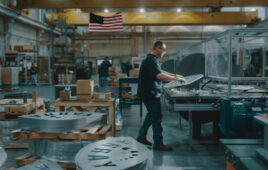The Plastics Pipe Institute (PPI), the major trade association representing all segments of the plastic pipe industry, has just published an important user document for handling high-density polyethylene (HDPE) conduit. Available free on PPI’s website, TN-58 “HDPE Conduit & Duct Handling Guide” provides information about the safe handling of reels and coils of HDPE conduit and duct. This includes the potential risks when cutting open such reels and coils. Certain installation considerations are also addressed from the perspective of worker safety.
 HDPE conduit, also known as PE conduit, is the preferred material to house and protect electrical power and communications cables in typical applications such as power utilities, telecommunications and other underground utilities. Benefits of HDPE conduit, according to PPI, include availability in long lengths without joints, high strength, flexibility, proven reliability and installation toughness. PE conduit, including Cable in Conduit (CIC), is widely used in trenching, horizontal directional drilling (HDD) and plowing installation methods.
HDPE conduit, also known as PE conduit, is the preferred material to house and protect electrical power and communications cables in typical applications such as power utilities, telecommunications and other underground utilities. Benefits of HDPE conduit, according to PPI, include availability in long lengths without joints, high strength, flexibility, proven reliability and installation toughness. PE conduit, including Cable in Conduit (CIC), is widely used in trenching, horizontal directional drilling (HDD) and plowing installation methods.
“PE conduit has been used safely in thousands of applications,” stated Lance MacNevin, P. Eng., director of engineering for PPI’s Power & Communications Division (PCD). “Still, there are precautions that should be adhered to when handling and transporting any product, and PE conduit is no exception.”
Prepared with input from PPI members who are industry experts, TN-58 covers a range of potential safety issues regarding the handling, unwinding, straightening and cutting of polyethylene conduit and duct. Several pictures and diagrams are used to illustrate specific issues. Topics include:
- Unloading PE Conduit in Free-Standing Reels
- Releasing the Outside Wrap of Reels or Coils and Cutting the Strapping
- Avoiding Entanglement of Conduit on Reels or Coils
- Straightening Coiled PE Conduit
- Safety when Cutting PE Conduit to Length
Tony Radoszewski, CAE, PPI president, added, “PPI members collaborated to list many potential safety issues, and how to avoid them, based on their years of experience.”
News item from PPI




Tell Us What You Think!